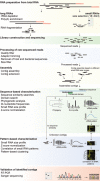Sequence-independent characterization of viruses based on the pattern of viral small RNAs produced by the host
- PMID: 26040701
- PMCID: PMC4513865
- DOI: 10.1093/nar/gkv587
Sequence-independent characterization of viruses based on the pattern of viral small RNAs produced by the host
Erratum in
-
Sequence-independent characterization of viruses based on the pattern of viral small RNAs produced by the host.Nucleic Acids Res. 2016 Apr 20;44(7):3477-8. doi: 10.1093/nar/gkw044. Epub 2016 Jan 21. Nucleic Acids Res. 2016. PMID: 26801643 Free PMC article. No abstract available.
Abstract
Virus surveillance in vector insects is potentially of great benefit to public health. Large-scale sequencing of small and long RNAs has previously been used to detect viruses, but without any formal comparison of different strategies. Furthermore, the identification of viral sequences largely depends on similarity searches against reference databases. Here, we developed a sequence-independent strategy based on virus-derived small RNAs produced by the host response, such as the RNA interference pathway. In insects, we compared sequences of small and long RNAs, demonstrating that viral sequences are enriched in the small RNA fraction. We also noted that the small RNA size profile is a unique signature for each virus and can be used to identify novel viral sequences without known relatives in reference databases. Using this strategy, we characterized six novel viruses in the viromes of laboratory fruit flies and wild populations of two insect vectors: mosquitoes and sandflies. We also show that the small RNA profile could be used to infer viral tropism for ovaries among other aspects of virus biology. Additionally, our results suggest that virus detection utilizing small RNAs can also be applied to vertebrates, although not as efficiently as to plants and insects.
© The Author(s) 2015. Published by Oxford University Press on behalf of Nucleic Acids Research.
Figures






References
Publication types
MeSH terms
Substances
Grants and funding
LinkOut - more resources
Full Text Sources
Other Literature Sources
Molecular Biology Databases

